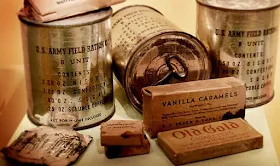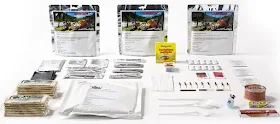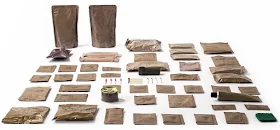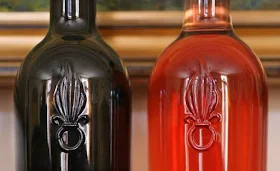As has been indicated in several of my more recent blogs, I’ve been really hard pressed for new subject matter that would be within the broad theme of the blog, and still be of interest to readers. What seems to occur when you are thinking hard for new subject matter, you get hungry. A quote attributed to Napoleon Bonaparte is “An Army Marches on Its Stomach”. Toy soldiers don’t have to eat, but their designers, manufacturers, purveyors and owners do. So, I thought it would be interesting to do a representative survey by nation of the military field rations carried currently by their respective armed forces.
Before exploring current rations thought I would briefly reflect back on their predecessors. Even though as a young boy growing up, with my dad as a Navy lieutenant and instructor with the V-5 Pre-Flight Program for naval aviation cadets at the University of Iowa, Iowa City, Iowa. I only recall K-rations as a heavily waxed (waterproof) and sealed olive-drab rectangular cardboard box. Couldn’t remember that there were three configurations, breakfast, dinner (lunch), and supper. As you will see there has been quite an evolution from then to the current configuration, which varies from nation to nation. Here are the contents of each, starting with the Breakfast Unit;
Breakfast Unit: canned entree veal(early version), canned chopped ham and eggs (all subsequent versions), biscuits, dextroseor malted milk tablets (early version), dried fruit bar, pre-mixed oatmeal cereal (late version) Halazone water purification tablets, a four-pack of cigarettes, Dentyne or Wrigley chewing gum, instant coffee, a packet of toilet paper tissues, and sugar (granulated, cubed, or compressed).
Dinner Unit: canned entree pork luncheon meat (Form of Spam, early version), canned processed American cheese, Swiss and American cheese, or bacon and cheese (cheese entree all subsequent versions), biscuits, 15 Dextrose or malted milk (diastatic malt)tablets (early) or five caramels (late), sugar (granulated, cubed, or compressed), salt packet, a four-pack of cigarettes and a matchbook, chewing gum, and a powdered beverage packet (lemon (c.1940), orange (c. 1943), or grape (c. 1945) flavor).
Supper Unit: canned meat, consisting of cervelatsausage (early version), either pork luncheon meat with carrot or apple(first issue), beefand pork loaf(second issue); biscuits; a 2-ounce (57 g) D ration ermergency chocolate bar (early version), Tropical bar, or (in temperate climates) commercial sweet chocolate bar (late version), a packet of toilet paper tissues; a four-pack of cigarettes, chewing gum, and a bouillonpacket (cube or powder).
As some may recall K-rations were followed by a series of C-rations. Typical of this series was the Type C-4 ration (circa 1954-1958), precisely the period of time this author was an NROTC Midshipman attending university. Don't remember eating any during the course of amphibious warfare orientation training with the
A sample C-4 ration (stamped March 1954) contained:
- 1 instruction sheet
- 2 cheesebars (1.5 net ounces/43 g net)
- 2 cerealclass 5bars (1.5 net ounces/43 g net)
- 3 type XII style 1enriched chocolate bars(1 ounce/28 g)
- 1 jellybar(2 ounces/56 g)
- 2 Fruit Cake Bars(2 ounces/56 g)
- 3 sticks Topps peppermintchewing gum
- 3 Domino sugarpackets
- 3 Nestea "soluble teaproduct" packets
- 1 packet of pure soluble sugar
- 1 packet of solublecreamproduct
- 1 bottle water purification tablets (iodine)
- 1 plastic bag
The current U.S. military field ration is the Meal, Ready-to-Eat, more commonly referred to as MRE.
General contents may include:
- Main course (entree)
- Side dish
- Dessertor snack(often commercial candy, fortified pastry, or Soldier Fuel Bar.)
- Crackersor bread
- Spread of cheese, peanut butter, or jelly
- Powderedbeveragemix: fruit flavored drink, cocoa, instant coffeeor tea, sport drink, or dairyshake.
- Utensils(usually just a plastic spoon)
- Flameless ration heater(FRH)
- Beverage mixing bag
- Accessory pack:
- Xylitolchewing gum
- Water-resistant matchbook
- Napkin / toilet paper
- Moist towelette
- Seasonings, including salt, pepper, sugar, creamer, and/or Tabasco sauce
- Freeze dried coffee powder
The following series are from a current Milan, Italy exhibit "K-RATION" by industrial designer Giulio Iacchetti, and appeared in an article in the UK Daily Mail. Both Mr. Iacchetti and the Daily Mail are duly acknowledged. and gratitude tendered for the use of the images on a non-profit basis. They are representative of the current issue of military field rations from twenty different countries.
The UK ration pack contains: Chicken sausage and beans; Mexican tuna pasta; paella; lemon cake; compote; Oat biscuit; raspberry jam; caramel cereal bar; apricot bar; salted cashews; sweets; hazelnut spread with cocoa; fruit drink; hot chocolate; coffee; coffee whitener; tea; Tabasco; sugar; water purification tablets; paper tissues; matches; chewing gums; wet wipes; spork and a re-usable bag.
The US pack: Vegetarian ratatouille with pasta; hot snack crackers; crackers; almond poppy seed pound cake; peanut butter; tropical punch powder; salt; seasoning blend; sugar; coffee; coffee whitener; chewing gums; wet wipe; matches; toilet paper; plastic spoon; water-activated disposable heaters and a beverage bag.
The US pack: Vegetarian ratatouille with pasta; hot snack crackers; crackers; almond poppy seed pound cake; peanut butter; tropical punch powder; salt; seasoning blend; sugar; coffee; coffee whitener; chewing gums; wet wipe; matches; toilet paper; plastic spoon; water-activated disposable heaters and a beverage bag.
Denmark: Cereal mix with fruits; pasta with meat sauce; rye bread; biscuits; pate; toothpicks; biodegradable fork-spoon; jam; honey; hazelnut spread; protein bars; isotonic drink; compote; chocolate drink; coffee; tea; matches; raisins; nut mix; chewing gum; sugar; salt; pepper; tomato ketchup; wet wipes and a toothbrush.
France: Beef tortellini; Oriental salad; salmon pate; instant soup; milky dessert; salted and sweet biscuits; coffee; tea; instant chocolate drink; sweets; nougat; fruit jelly; energy bar; muesli; isotonic drink powder; chocolate; jam; tissues; reheating kit; matches and water purification tablets.
Spain: Chicken and pasta instant soup; baked beans with sausages; sardines in vegetable oil; apricot cream; water purification tablets; solid fuel tablets; isotonic drink; chewing gum; matches; stove; papers napkins; toothpaste; hand disinfectant; chocolate with almonds; almond nougat; sesame bar; sweets and isoenergetic gel with vitamins.
Sweden: Yoghurt with breakfast flakes; chicken Rogan josh with rice; meatballs with pasta; sweets; peanut butter; nut cream; chocolate cake; oat biscuits; salted peanuts; honey roasted peanuts; exotic fruit isotonic drink; chocolate drink; chewing gums; wet wipes and coffee.
Tanzania: Chicken stew; rice; porridge; biscuits; mango drink; orange drink; coffee; tea; sugar; pepper; salt; wet wipe; paper napkin; matches; fuel tablets; water-activated disposable heaters and plastic cutlery.
Astronaut Samantha Cristoforetti's international space station ration pack: Peas' brown rice; champignon mushrooms; mackerel' leek cream; quinoa; dried tomatoes and turmeric chicken.
Thailand: Yellow soup with fish; jasmine rice; beef with pepper and garlic; chili powder; fish sauce; dried fruits and a plastic spoon.
Estonia: Muesli; whole rye bread; coffee; chicken soup with noodles; dark chocolate with cornflakes and guarana; sweet crackers; toffees; tea; isotonic drink; sugar; salt; pepper; liver pâté; beef goulash; disinfectant wipes; plastic bag and matches.
Holland: Tea; coffee; coffee whitener; sugar; chocolate drink; jam; fruit jelly; vitamin tablets; instant soups; broth powder; fruit drinks; chocolate biscuits; fruit filled biscuits; meat, fish, vegetable pâté; candied almonds; chocolate; sweets with vitamin C; sweets; sesame bar; sambal; oatmeal block; muesli; meat with peas and potatoes; hot chicken stew; chicken korma; beef and potato hotpot; ham, leeks and potato hotpot; zipper bags; matches; paper tissues; salt; pepper; chewing gums and toothpicks.
Israel: Chicken meatballs with rice; beef meatballs with rice; beans with tomato sauceRice stuffed grape leaves; vegetarian meal with rice and chickpeas; sweetcorn; green olives; tuna in vegetable oil; chocolate dessert; peanuts; halva; candied fruit mix with pineapple, pawpaw, raisin, and blueberries; plastic bags; tin opener and water-activated disposable heaters.
Italy: Cereal and chocolate bar; fruit jellies; condensed milk; coffee; chocolate; sugar; salt, ravioli with meat sauce; pork in jelly; crackers; fruit salad; multivitamin tablets; bran tablets; pasta and beans; chicken in jelly; energetic bar' toothbrushes; kit for water disinfection; matches; toothpicks; paper rubbish bags; camp stove; fuel bars; napkins; plastic spoon; plastic cutlery.
Slovenia: Coffee; coffee whitener; tea; vitamin drinks; sugar; vitamin sweets; energy bars; chocolate jam; chocolate muesli with dehydrated milk; dehydrated wild berry yogurt dessert; pasta with porcini; chicken and potato stew; fish and vegetable pâté; tuna in olive oil; bread; chewing gums; disinfectant wipes; can opener; rubbish bag; matches and plastic cutlery.
Lithuania: Beef stew with pearl barley; crackers; almonds; blackcurrant jam; cherry drink with vitamins; chocolate; chicken broth powder; sugar; wet wipe; matches; fuel tablets; water-activated disposable heaters; paper tray; cable tie and plastic spoon.
New Zealand: Creamy chicken and potatoes; Thai lamb curry; chocolate biscuits; Marmite; tomato ketchup; salt; pepper; sugar; tea; coffee; condensed milk; waterproof matches; chocolate drink; scouring pad; cheese; muesli; isotonic drink; bread; instant soup; plastic bag; peanuts and raisins; chewing gums; chocolate; napkins; onion flakes; sweets; instant noodles; muesli bars and strawberry fruit grains.
Germany: Ravioli with mushroom sauce; Indian rice with chicken cutlet; bread; biscuits; meat pâté; semolina with fruits; snack; jam; coffee; tea; sugar; coffee whitener; salt; fruit drinks; chocolate; chewing gums; water purification tablets; multipurpose paper; wet wipes and matches.
Poland: Meat with rice and vegetables; canned pork; biscuits; raspberry jam; lemon tea; dried fruit mix; cereal and fruit bar; chewing gums; sweet with coffee extract; sweet with vitamin C; salt; pepper; plastic lid; napkin; wet wipe; toilet paper; zipper bag; plastic spoon; straw; hooks; water purification tablet and water-activated disposable heaters.
Russia: Biscuits; Whole-wheat biscuits; beef goulash; salted lard; liver pate; meat pate; beef with buckwheat semolina; meat with peas and carrots; ratatouille, fruit and berry concentrate; cheese spread; jam; compote; chocolate; tea; coffee; coffee whitener; sugar; salt; pepper; multivitamin tablets; chewing gums; sweets; water purification tablets; heater; waterproof matches; disinfectant wipes; paper napkins; plastic spoons and a plastic knife.
Upon closer inspection, and as suspected by both international culinary reputation and Napoleon’s advise, the French military field ration ranks as one of the world’s best.
The name of the ration is called, “Ration de Combat Individuelle Rechauffable” (Combat Ration Individual Reheatable), or RCIR. As previously described each box includes: Main meals x2, Hors d’oeuvre, Soup, Cheese or a Crème dessert, Salted and Sweet crackers x16, Chocolate bar, Package of caramels, Gum, “Breakfast package” (Tea, Coffee, Cocoa, Milk powder, Sugar, etc), Nougat bar, Fruit gelee, Sugar cubes, Paper towels x10, Heating kit with fuel, disposable stove, waste bag and water purification tablets x6, etc. A single ration contains 3200 calories and is intended to provide the nutritional needs for one soldier for one day. RCIRs are delivered in boxes of 12 rations. A single pallete of RCIRS will contain 20 boxes or 240 RCIRs.
- Soup
- Cereal bar
- Chocolate bar
- Chewing gum
- Instant cocoa
- Evaporated milk
- Coffee (freeze-dried)
- Stove, esbit tablets, matches
- Water purification tablet
- 1st entree
- 2nd entree
- Folding paper towels
- Crackers (salty/sweet)
- Appetizer
- Dessert Sugar/sweetener
The Menu variety in 1999 included;
Menu #
|
Hors d’oeuvre
|
Main dish A
|
Main dish B
|
1
|
Chicken in Jelly
|
Beef Salad
|
Tunny Potatoes
|
2
|
Salmon Paté
|
Salmon Rice Vegetables
|
Shepherd’s Pie
|
3
|
Mackerel Paté
|
Stewed Beef
|
While Veal Stew
|
4
|
Chicken Liver Paté
|
Sauté of Rabbit
|
Chile con Carne
|
5
|
Tuna in Sauce
|
Paella
|
Stewed Veal “Marengo”
|
6
|
Fish Paté
|
Mutton Stew Flageolets
|
Stewed Chicken
|
7
|
Mackerels in Sauce
|
Stewed Lamb “Navarin”
|
Lasagnes
|
8
|
Duck Paté
|
Tuna Salad
|
Pork and Lentils
|
9
|
Liver Paté (Pork)
|
Earthenware-Dish “Cassoulet”
|
Cannelloni
|
10
|
Pork Paté
|
Pork and Greens
|
Stewed Beef and Carrots
|
11
|
Pork Paté and Mushrooms
|
Stewed Pork and Potatoes
|
Stewed Beef “Bourguignon”
|
12
|
Pork Ham Paté
|
Pork Salad
|
Seafood “Risotto”
|
13
|
Pork Paté
|
Chicken and Greens “Parisienne”
|
Sweet and Sour Pork
|
14
|
Tuna Fish Paté
|
Sausage and Lentils
|
Cockered Stewed in Red Win
|
The revised Menu in 2004 included:
Menu #
|
Hors d’oeuvre
|
Main dish A
|
Main dish B
|
1
|
Tuna paste
|
North African chicken stew
|
Tuna and potatoes
|
2
|
Salmon paste
|
Salmon, rice and vegetables
|
North African lamb stew
|
3
|
Mackerel paste
|
Parisian chicken
|
Duck, olives and potatoes
|
4
|
Chicken liver paté
|
Sauté of rabbit
|
Whitefish, rice and vegetables
|
5
|
Tuna in sauce
|
Basque chicken
|
Squid “Armoricaine”
|
6
|
Sardines
|
Lamb stew with beans
|
Chicken with spring vegetables
|
7
|
Mackerel in sauce
|
Stewed lamb “Navarin”
|
Tuna salad
|
8
|
Duck mousse
|
Alsatian pork stew
|
Pork and lentils
|
9
|
Venison terrine
|
White bean, sausage and duck casserole
|
Creole pork with rice and pineapple
|
10
|
Traditional pork paste
|
Pork with vegetables
|
Basque duck and vegetable soup
|
11
|
Forest terrine
|
Stewed pork and potatoes
|
Sausage and sauerkraut
|
12
|
Ham paté
|
Pork salad
|
Paella
|
13
|
Hare paté
|
Veal, tomato, and olive stew
|
Sweet and sour pork
|
14
|
Rabbit paté
|
Sausage and lentils
|
Beef salad
|
Reading the variety of the menu leaves little doubt why the reported current rate of exchange is 5 MREs for 1 RCIR. There is only one of the entrees which this author has heard that troops do not like. A sergeant in the French Foreign Legion (a native of Northern Italy) on active service in Mali, said in a recent BBC video interview that he tries to avoid the "lamb stew". This has to be either #6 Lamb stew with beans, or #7 Stewed lamb "Navarin", am not sure which one. It may just be a personal preference.
The author is reminded during the composition of this article, when in 1973 during survival training with his naval reserve unit in the undeveloped jungle-like fields outside Schofield Barracks, Hawaii, he and his shipmates would have gladly paid good money for a few RCIRs. At the time our menu consisted of mongoose stew, sprout-papaya-onion-soup and baked green bananas. The following photographs depict our "skills" making an improvised eating container and opening a coconut. Will never forget our instructor SSGT Fillipe, an army Force RECONDO, who as a young teenager had served with the famed Philippine Scouts during WWII. He had a classic frequent remark, "Something to be considered in the area."
The author is reminded during the composition of this article, when in 1973 during survival training with his naval reserve unit in the undeveloped jungle-like fields outside Schofield Barracks, Hawaii, he and his shipmates would have gladly paid good money for a few RCIRs. At the time our menu consisted of mongoose stew, sprout-papaya-onion-soup and baked green bananas. The following photographs depict our "skills" making an improvised eating container and opening a coconut. Will never forget our instructor SSGT Fillipe, an army Force RECONDO, who as a young teenager had served with the famed Philippine Scouts during WWII. He had a classic frequent remark, "Something to be considered in the area."
During Operation Desert Storm (1991) elements of the French Foreign Legion were embedded within the principal units of the French Army engaged in the action, namely the 6th Light Armoured Division (6 DLB), and the 4th Regiment of Dragoons from the 2nd Armoured Division. These forces of the Allied Coalition were initially deployed on the left (Western) flank, prior to initiating the liberation of Kuwait. This author distinctly remembers an evening news segment in which a Legion chef was profusely apologizing because he did not have the correct wine for his “from scratch” evening’s presentation of Beef Bourguignon. It’s my understanding that for some time units of the Legion had, and still do, have the prerogative of hiring their own chefs.
For those seeking further detailed presentations of individual RCIRs, go to YouTube and in the search window, type in the search term 'French Military Ration RCIR', and literally dozens of video presentations of the meals will come up.
It is not widely known that the Legion has its very own winery. For those who might be interested see;




































Amazing Post Good article your site
ReplyDeleteDigital Pen Quran in Pakistan